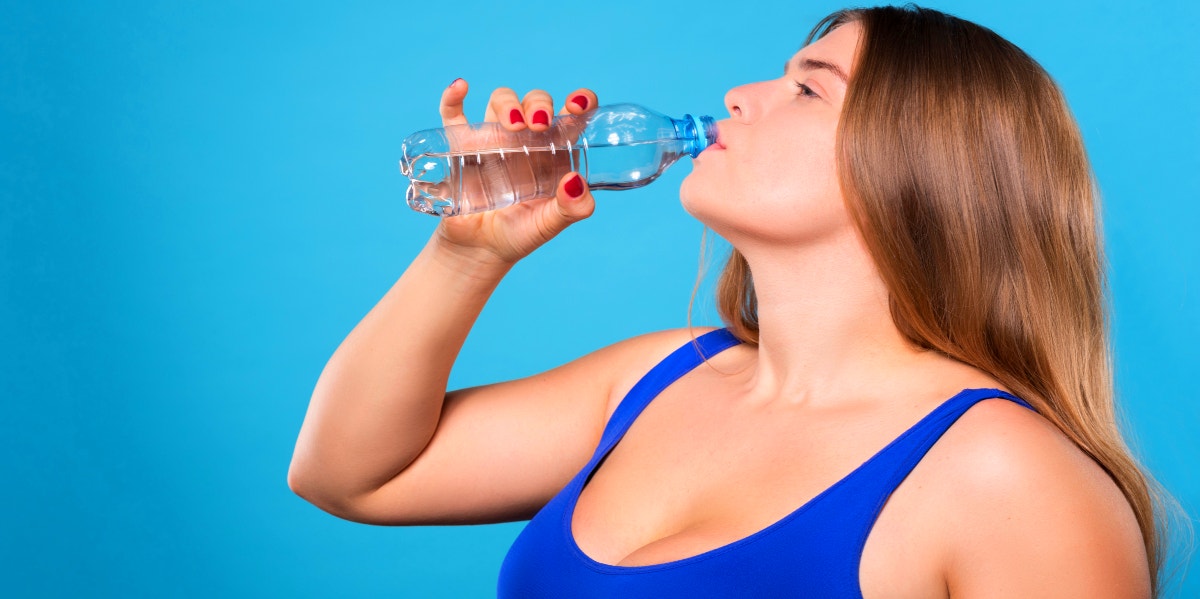How Long Can You Survive Without Water? Dehydration, Explained
Spoiler: Not very long.
 Dmytro Zinkevych/shutterstock
Dmytro Zinkevych/shutterstock While our bodies do rely on sustenance and require the perfect concoction of vitamins, minerals, and proteins, we can technically survive a pretty long time without eating actual food.
Case in point: those people who swear by mild intermittent fasting, or those who even participate in extreme versions of fasting where no food enters their body for weeks on end.
Water, though? That’s an entirely different topic.
How long can you go without water?
Our bodies can’t just be like, “Okay, see you later, H2O” without facing some serious repercussions.
And not to get all dark with you, but the most serious repercussion is literal death. Hey, we’re not trying to swim in morbidity here; we’re simply laying out the facts about how much our bodies rely on water.
In case you ever wondered how long you could actually survive without water, we’ve got the answer for you.
What happens to our bodies the longer we go without water?
Simply put, dehydration is what happens when your body is losing more water than it’s consuming. When this occurs, it causes your entire body to become imbalanced, which can lead to some pretty gnarly symptoms.
For example, if you’ve ever gotten a headache after a long hike or a brutal workout, that’s a sign you’re experiencing dehydration. Or, if you’ve ever noticed that your skin is dry, sallow, and lackluster, that’s another sign you’re probably not getting enough H2O.
Other signs of dehydration include dizziness, dry mouth, and, of course, feeling thirsty.
In fact, Gabriela Peacock, a nutritionist and founder of GP Nutrition, says, "Feeling thirsty is the key innate sign that the body needs more water. Without proper hydration you can feel fatigued and lethargic. Concentration and brain function may be slowed, too."
Also, if your urine smells stronger or has changed in color, this is a tell-tale sign of dehydration.
Peacock adds, “The darker the color, the more dehydrated you are. You may also go to the loo less often as the body holds on to water for longer. Less than four times a day is a sign of dehydration. Bowel movements may also slow down, leading to constipation.”
As you probably guessed, mild dehydration turns severe if it isn’t addressed. When your body goes into severe dehydration, it’s common to feel confusion, fainting, extreme dizziness, rapid heartbeat and breathing, and no energy.
"Severe dehydration can lead to fainting. You may feel lightheaded or faint when you stand up suddenly after sitting or lying down. These symptoms may happen when dehydration lowers your blood volume and blood pressure. Heart palpitations, a fast heartbeat and quick breathing may also be signs of severe dehydration," Peacock warns.
So, why does all this happen?
Lisa De Fazio, a registered dietitian and nutritionist, explains, "[With a lack of water], your blood becomes more concentrated and this causes your kidneys to retain water. The result is that you urinate less. Also, the thicker and more concentrated your blood becomes, the harder it is for your cardiovascular system to compensate, so it increases your heart rate to maintain blood pressure."
In these severe cases, emergency assistance is needed. It’s common to be hooked up to IVs to flush the body with fluids and bring it back to a rebalanced state.
Fortunately, our bodies are pretty amazing, and when we begin to experience dehydration, a signal is sent to our brains that essentially says, “Please send water.”
What's physicially happening, explains De Fazio, is that "cells shrink as water is borrowed to maintain other stores, such as the blood. The brain senses this and triggers an increased sensation of thirst."
Because our bodies are so good at sending us these signals, potential death due to dehydration really only occurs in very severe cases where there’s zero access to water (or clean water) that can lead to potential death.
Exactly how long can you go without water?
While we can technically survive for several weeks without food, three or four days is about the max when it comes to lack of water consumption. If you’re lucky, you might be able to make it a full week.
Peacock adds, "That estimate would certainly be shorter in difficult conditions, like intense heat."
It helps if you’re getting water from other sources, such as food, and in a welcoming environment (compared to a dry and hot one). Eventually, though, the imbalance will become too great for your body to withstand.
This is certainly a large enough window to get emergency help should you need it, but it’s still an incredibly small amount of time when you really think about it.
This all just goes to show how important it is to get your daily eight glasses, and how vital it is to carry water with you whenever you’re hiking, camping, or are away from clean, drinkable water.
Wendy Rose Gould is a freelance lifestyle reporter based in Phoenix, Arizona. She contributes to NBC, Refinery29, Brides, Allure, Spotlyte, Total Beauty, Soko Glam, and others.

